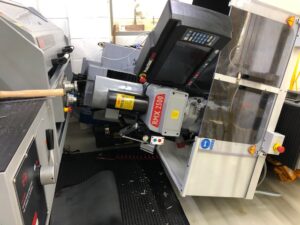Engineering company Kent Auto Developments Limited was fined £18,349 (inc.costs) after a worker suffered injuries after becoming entangled in a metal working lathe whilst using hand-held emery cloth.
The circumstances were:
- On 10 August 2020, Joshua Halls was completing the process of polishing brake drums for a Mini, rotating on a manual metalworking lathe.
- Joshua was applying emery cloth by hand, a practice condoned by the company,
- The business had failed to implement a safe system of work.
- Employees routinely polished brake drums with emery cloth by hand on the lathe, a task known to be dangerous due to the potential risk of entanglement of the cloth in the rotating parts of the lathe, which can result in serious personal injury.
- He was drawn into the machine which resulted in lacerations to his forearm and injuries to his neck and face.
- The incident was not RIDDOR-reported until three months after the incident.
- If the requirement to use emery cloth on a lathe is unavoidable, then tool posts and holding devices should be used.
The HSE inspector commented:
“We still see incidents like this, where unsafe work practices with machinery lead to injury, despite the existence of specific guidance published by HSE.
Workers coming into contact with machinery is the fourth biggest cause of workplace fatalities in Great Britain, with 14 people killed in the year 2020/21. Over 50,000 non-fatal injuries were reported by employers in the same year.
Employers should ensure that measures are taken to prevent workers from sustaining injury, where it is evident that persons are at risk of becoming entangled in machinery. It’s important that, when people do get hurt, the relevant authorities are notified so that action can be taken to prevent recurrence.”

